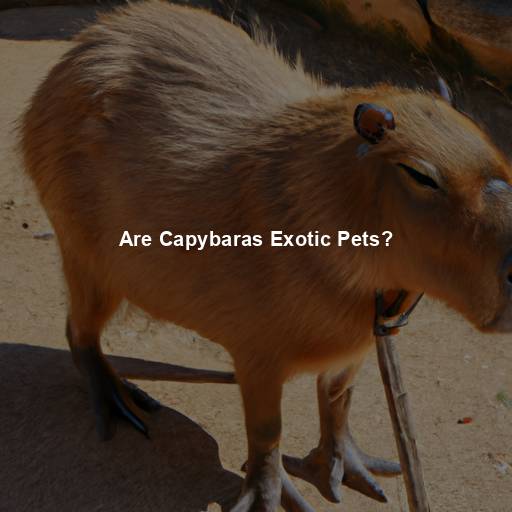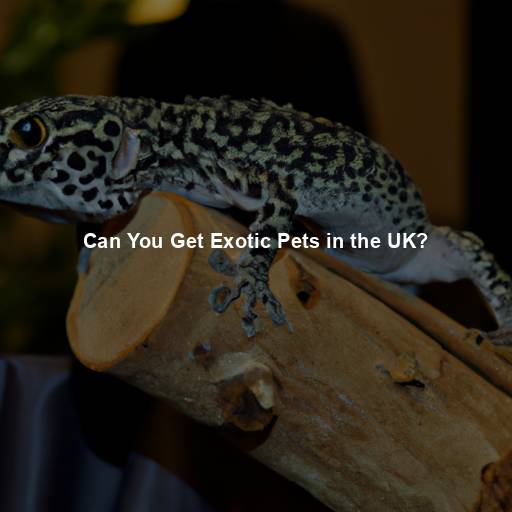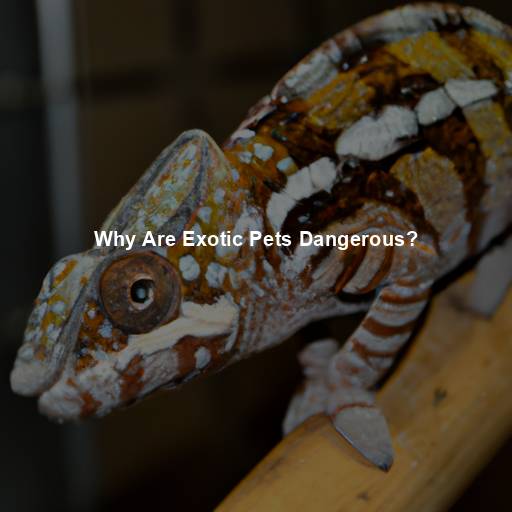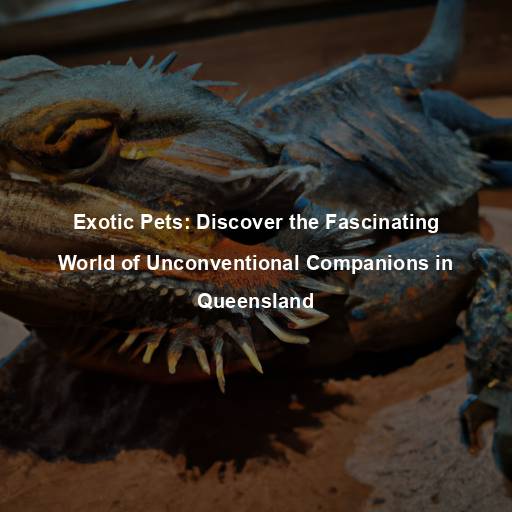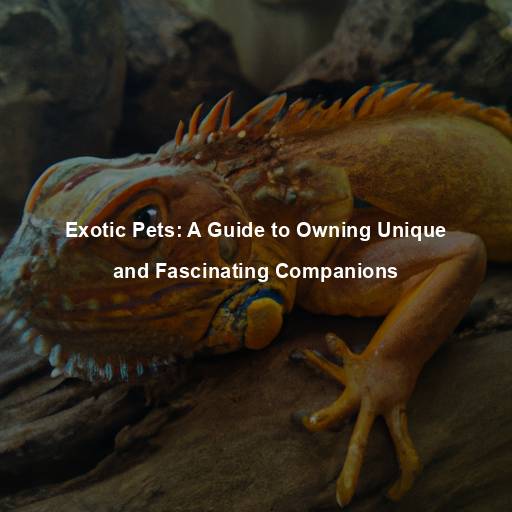Should Exotic Pets Be Allowed?
Last Updated on July 11, 2023 by Evan
Contents
- 1 Exploring the Ethical and Practical Considerations
- 2 The Appeal of Exotic Pets
- 3 Ethical Concerns
- 4 Practical Considerations
- 5 Striking a Balance
- 6 The Cultural Perspective
- 7 The Role of Legislation and Regulation
- 8 The Importance of Public Perception and Shift in Attitudes
- 9 Case Studies and Lessons Learned
- 10 The Global Perspective
- 11 The Human-Animal Bond
- 12 Moving Forward: Finding Common Ground
- 13 FAQs: Should Exotic Pets be Allowed?
- 13.1 What are exotic pets?
- 13.2 Why should exotic pets be allowed?
- 13.3 What are the potential risks associated with owning exotic pets?
- 13.4 How does allowing exotic pets affect conservation efforts?
- 13.5 Are there any regulations in place regarding exotic pets?
- 13.6 What responsibilities come with owning an exotic pet?
- 13.7 Can exotic pets be harmful to our native wildlife?
- 13.8 Is it ethical to keep exotic pets?
Exploring the Ethical and Practical Considerations
In recent years, the ownership of exotic pets has become a subject of debate and controversy. While some argue that owning these unique creatures can bring joy and excitement to our lives, others raise concerns about the ethical implications and potential dangers associated with keeping such animals as pets. This article delves into the multifaceted aspects of the exotic pet trade and explores the question: should exotic pets be allowed?
Understanding Exotic Pets
In a captivating exploration of the enigmatic realm of exotic pets, we find ourselves compelled to unravel the intricate tapestry of ethical and practical musings that surround these captivating creatures. Delving deep into the heart of the matter, we endeavor to unearth the essence of what it truly means to embrace the allure of the unconventional when it comes to our furry, scaly, and feathered companions. From the ethereal realm of reptiles with their mesmerizing serpentine forms to the ethereal melodies of vibrant avian fauna, the spectrum of exotic pets unfolds before us like a riddle waiting to be solved. Standing as enigmatic emissaries from distant lands, these majestic creatures beckon us to tread the uncharted path, challenging societal norms and opening our minds to the perplexity of their specific requirements and captivating splendor.
The Appeal of Exotic Pets
Unique Companionship
One of the primary reasons why some individuals are drawn to the idea of owning an exotic pet is the allure of having a unique companion. Exotic pets offer a sense of novelty and intrigue that is unmatched by more traditional pets. The exotic nature of these animals can create a deeper connection and spark a sense of wonder and curiosity in their owners.
Educational Value
Imagine welcoming an extraordinary menagerie into your home – exotic pets that not only captivate with their beauty but also impart invaluable knowledge about the magnificent tapestry of the animal kingdom. These captivating creatures offer a front-row seat to explore their native habitats, observe their intricate behaviors, and understand their conservation requirements. Through this immersive experience, a deep-seated love for wildlife and a burning desire to protect them can be sparked, creating a lasting impact on both individuals and global conservation efforts.
Personal Freedom and Choice
There is a fiery debate swirling around the idea of owning exotic pets, with fervent supporters ardently defending the notion of freedom of choice when it comes to our four-legged (or rather, not-so-four-legged) companions. Their argument is a tangled web of complexities, asserting that responsible ownership serves as the key that unlocks the door to a harmonious bond between humans and creatures of the extraordinary kind. In their eyes, the potential for a deeply fulfilling and symbiotic connection outweighs the enigmatic challenges that come with caring for these captivating creatures. It’s a perplexing dilemma, one that ignites passions and leaves us wondering where the line between our desires and the welfare of these exotic beings truly lies.
Ethical Concerns
Animal Welfare
The captivating world of the exotic pet trade is a hot topic buzzing with ethical perplexity. Stirring the pot of debate, critics express concerned whispers about the woeful fate of these magnificent creatures. Their passionate arguments reveal tales of inadequate dwellings, subpar care, and the heartbreaking absence of the natural environments vital for their overall welfare. We find ourselves pondering the daunting question of whether we possess the capabilities to furnish these charismatic beings with the exacting blend of physical and mental nourishment they need to truly flourish.
Conservation and Illegal Trade
Another significant ethical concern associated with exotic pets is the impact on wildlife conservation and the illegal trade of endangered species. The demand for rare and exotic animals fuels the illegal wildlife trade, pushing many species to the brink of extinction. It is essential to question whether the desire for exotic pets is worth contributing to the decline of already vulnerable populations in their natural habitats.
Zoonotic Diseases
Owning exotic pets may seem glamorous at first glance, but let’s not overlook the potential hazards they can bring to the table. These peculiar creatures have the capacity to harbor zoonotic diseases, a term that sounds as perplexing as it is alarming. From mild infections to more severe ailments like salmonellosis or even monkeypox, the range of health risks cannot be ignored. To navigate this uncharted territory responsibly, it becomes imperative to prioritize proper handling techniques, upholding stringent hygiene practices, and ensuring regular visits to the veterinarian for our unusual companions.
Practical Considerations
Specialized Care and Expertise
Exotic pets often require specialized care and expertise to ensure their well-being. Their unique dietary needs, environmental requirements, and potential behavioral challenges demand a level of knowledge and resources that may be beyond the average pet owner. It is crucial to consider whether we have the means and commitment to provide the necessary care for these animals throughout their lives.
Enclosure and Space
Exotic pets often require large enclosures that mimic their natural habitats. The space required to house these animals safely and comfortably can be a significant consideration. Not only does this impact the financial aspect of owning an exotic pet, but it also raises questions about the availability of adequate space in our homes and communities.
Invasive Species and Environmental Impact
The consequences of exotic pets finding their way into the wild are quite staggering. You see, when these non-native animals enter a new ecosystem, all sorts of havoc can unfold. Delicate ecosystems can be thrown off balance, native wildlife populations can suffer, and the long-term repercussions can be mind-boggling. It is absolutely crucial to carefully assess the environmental risks that come with owning exotic pets and take into account the lasting effects that can ripple through our natural world.
Striking a Balance
When it comes to the contentious issue of owning exotic pets, there’s no denying the tangled web of perspectives and dilemmas that surround it. The allure and fascination of these more unusual creatures is undeniable, but we must navigate through a perplexing maze of ethical quandaries and practical concerns. Balancing the welfare of these animals, the imperative to conserve their species, and the potential risks to public health all add to the complexity of this debate. In a world bursting with conflicting opinions, the question remains: should we allow the ownership of exotic pets?
In today’s world, the subject of exotic pets remains enigmatic, as perplexing as deciphering the intricate pattern on a kaleidoscope. It is an undeniable fact that regulations and licensing systems are pivotal in the realm of responsible ownership, acting as a guiding light through the maze of potential risks and uncertainties. By tightening the reins and bolstering the force of the law, we can dare to dream of a future free from the clutches of illegal trade in endangered species, where only the wise and diligent are permitted to assume the mystical role of guardians to these extraordinary creatures.
When pondering the contentious topic of allowing or condemning the ownership of exotic pets, a multifaceted approach is imperative. By delving into the ethical ramifications, weighing the practical factors, and acknowledging the possible effects on animal welfare, conservation initiatives, and public safety, we can navigate this convoluted issue with discernment and clarity. In the end, it is our shared obligation to seek equilibrium between our longing for esoteric companionship and the undeniable responsibility we bear towards the diverse creatures that cohabit this magnificent planet. The impetus, therefore, lies in education and awareness, as we strive to create a more enlightened society that values the intricacies of this complex matter.
Promoting Responsible Ownership
When it comes to owning exotic pets, education and awareness are like the keys to a mysterious kingdom. We believe that by immersing potential owners in a world filled with knowledge about these enigmatic creatures, we can unlock a future of responsible ownership. From understanding the unique needs of each animal to grasping the level of commitment and resources required, our aim is to empower individuals to make informed choices that ensure a lifetime of proper care.
Encouraging Adoption and Rescue
When it comes to the fascinating world of pets, let’s not forget about the intriguing realm of exotic companions. A plethora of compassionate organizations devoted to animal welfare pour their hearts and souls into the daunting task of rescuing and restoring the well-being of abandoned or mistreated exotic creatures. By fostering a culture of adoption rather than supporting the exotic pet trade, we pave the way for a brighter future, diminishing the insatiable demand for these extraordinary beings while nurturing them in caring and nurturing homes.
The Cultural Perspective
Cultural Significance
In diverse societies, the notion of having exotic pets takes on various layers of meaning. These captivating creatures often represent more than mere companionship, embodying cherished symbols of social standing, influence, and even divine linkages. Ample sensitivity must be employed when engaging in conversations surrounding these cultural practices, taking into account their rich historical roots and deeply ingrained traditions.
Cultural Preservation and Alternatives
While respecting cultural values, it is crucial to explore alternatives that align with conservation efforts and animal welfare. Encouraging cultural preservation through education and supporting initiatives that promote wildlife conservation can help shift the focus towards protecting these animals in their natural habitats rather than keeping them as pets.
The Role of Legislation and Regulation
Strengthening Legislation
As the captivating world of exotic pet ownership continues to garner attention, it is essential to delve into the multifaceted realm of legislation and regulation. These pivotal elements serve as formidable guardians, diligently safeguarding against ethical quandaries and pragmatic complexities that invariably arise. By implementing more rigorous laws, we can construct an impregnable fortress against the illegal trade of endangered species, ensuring that only those adorned with the indomitable duo of expertise and resources can welcome these majestic creatures into their lives. Adding a layer of scrutiny through regular inspections, licensing requirements, and penalties for non-compliance aptly ensures the enforcement of responsible ownership, instilling a sense of accountability within the hearts of pet enthusiasts.
Collaboration with Conservation Organizations
In the ever-evolving realm of environmental protection, a delicate dance of collaboration emerges between legislative entities and conservation organizations. Like strands of DNA intertwining, their combined efforts bring forth effective regulations that safeguard our precious natural world. By bridging the gap between knowledge and decision-making, conservation organizations lend their unique expertise, ensuring legislation becomes a steadfast champion of the animals and ecosystems it seeks to preserve.
The Importance of Public Perception and Shift in Attitudes
Challenging Stereotypes
The world of exotic pet ownership is a complex tapestry, where public perception weaves its intricate threads. It is imperative to untangle the web of misconceptions that envelope these fascinating creatures and showcase their true essence. By shedding light on the innate uniqueness and captivating behaviors of exotic animals, we can challenge the preconceived notions and pave the way for a more enlightened and compassionate perspective. Let us embark on a journey that unravels their intrinsic worth and replaces bewilderment with appreciation.
Shifting the Focus to Conservation
In a world where our fascination with exotic pets has taken center stage, perhaps it’s time to explore a new narrative. Let us channel our love and admiration for these fascinating creatures into a different outlet – one that focuses on preserving their native homes. By rallying individuals to actively participate in wildlife conservation, we can create a powerful connection between humans and these remarkable species, ultimately ensuring a brighter future for both.
Exotic Pet Industry
The world of exotic pets has blossomed into a vibrant tapestry, weaving together breeders, retailers, veterinarians with niche expertise, and manufacturers of supplies designed specifically for these extraordinary creatures. This industry, pulsing with life and possibilities, generates substantial revenue that permeates through its many interconnected channels. Advocates passionately contend that a ban on exotic pet ownership would unravel this intricate web, leaving behind a trail of economic turmoil: whole livelihoods upended, cherished businesses shuttered, and countless individuals grappling with the uncertainty and loss that lingers in its wake.
Regulation and Economic Balance
When it comes to owning exotic pets, there’s more than meets the eye. It’s not just about the economic side of things, but also about the ethical and practical aspects that are often overlooked. Finding a middle ground that takes into consideration both financial interests and the welfare of animals is of utmost importance. By putting in place regulations that promote responsible ownership, we can create a harmonious environment where the economic ecosystem thrives alongside the well-being of these unique creatures.
Case Studies and Lessons Learned
Success Stories
In a world full of surprises, it’s fascinating to explore the unconventional bond between humans and exotic pets. While controversial, there exist extraordinary tales of individuals who have embraced the responsibility of nurturing these rare creatures. These individuals, armed with an unparalleled passion for conservation, strive to ensure the welfare and preservation of endangered species. Their remarkable journeys are a testament to the potential rewards that can emerge when the right people, armed with expertise and dedication, embark on the captivating path of exotic pet ownership.
Lessons from Mistakes
In a world full of intriguing possibilities, it can be tempting to delve into the realm of exotic pet ownership. Yet, amidst the allure lies a formidable web of complexity and uncertainty. The veil of excitement may be lifted when we consider the unfortunate instances where such unconventional companions have escaped their confines, wreaking havoc on both themselves and the delicate ecosystems they inhabit. It is these cautionary tales that demand our attention, imploring us to exercise responsible ownership, maintain secure containment, and truly comprehend the intricate needs of these extraordinary creatures.
The Global Perspective
Varying Regulations and Practices
The world of exotic pet ownership is a perplexing labyrinth filled with a burst of regulations that differ, perplexingly so, from country to country, and region to region. From strict laws that lock down certain species like elusive treasures to relaxed policies that conjure an image of a wild menagerie, the global perspective is a swirling vortex of ethical and practical considerations. Navigating this extraordinary terrain can provide invaluable insights, shedding light on the enigmatic choices made around the globe.
Learning from International Best Practices
As we delve into the realm of international best practices, we uncover a labyrinth of successful strategies that champion responsible ownership and safeguard animal welfare. These noble pursuits find solace in countries where a tapestry of comprehensive legislation, enlightening educational campaigns, and unwavering enforcement weave a remarkable blueprint. Through a harmonious symphony of collaboration and knowledge-sharing, the foundation is laid for a boundless global community devoted to the holistic well-being of exotic creatures. Join us on this journey of discovery and let us unlock the mysteries that lie within.
The Human-Animal Bond
Emotional Connection and Well-being
There’s something truly extraordinary about the bond between humans and animals – it’s a mystical connection that defies any species boundaries. Exotic pet owners, amidst the whirlwind of their unconventional choices, often find themselves surprised by the immense emotional attachment they develop. It’s as if these magnificent creatures, whether scales or feathers, can fill a void in their lives with a sense of companionship, unwavering support, and a purpose that ignites their souls, ultimately leading to a profound state of well-being.
Responsible Ownership and Mutual Benefit
Creating a strong connection between humans and animals hinges on responsible ownership, an indispensable factor in nurturing a harmonious bond. By embracing the responsibilities that come with owning a pet, such as meeting their unique physical and behavioral requirements, we can safeguard their overall welfare. This conscientious approach not only enhances the lives of exotic pets but also bestows profound benefits upon their owners, forging a mutually rewarding companionship that transcends boundaries.
Moving Forward: Finding Common Ground
The issue at hand, regarding the permissibility of exotic pets, is a true tangle of intricate and convoluted facets. To truly grasp its essence, one must embark on a labyrinthine journey encompassing ethical quandaries, logistical dilemmas, financial ramifications, and a panoramic view of worldwide viewpoints. Albeit divergent in nature, forging a collective understanding is vital to safeguard the welfare of these unique creatures, bolster conservation endeavors, and foster accountable guardianship.
Embracing open communication, enhancing knowledge, enacting robust legislation, and championing preservation ventures, we can forge a harmonious coexistence between our diverse animal companions and our sociable Homo sapiens tribe. Hand in hand, we can fashion a forthcoming era that appreciates, safeguards, and cherishes exotic pets while upholding the sanctity of their native dwellings and safeguarding the welfare of all involved parties.
FAQs: Should Exotic Pets be Allowed?
What are exotic pets?
In an enchanting realm beyond the ordinary, a menagerie of extraordinary companions dwells, eagerly awaiting their moment in the spotlight. Behold the realm of exotic pets, where creatures from the untamed wilderness grace our lives with their puzzling allure. From the sinuous serpents that slither with untamed elegance to the mischievous monkeys with their playful antics, these enchanting beings embody a mesmerizing sense of wonder. With their distinctive charm and the undeniable allure of the rare and unfamiliar, one cannot help but be captivated by the enigmatic allure of welcoming these extraordinary creatures into our homes.
Why should exotic pets be allowed?
There is an ongoing debate surrounding the contentious topic of exotic pets, with proponents arguing that individuals should have the autonomy to select the creature of their choice. The enchanting allure of these extraordinary animals is believed to bestow happiness and companionship upon their human counterparts, mirroring the bond formed with more commonplace pets. Moreover, for those who possess an unyielding passion for wildlife, the ownership of exotic pets is viewed as a gateway to education and active involvement in the conservation and protection of these captivating species.
What are the potential risks associated with owning exotic pets?
Owning exotic pets can pose significant risks. Many of these animals have specific dietary and environmental needs that are difficult to replicate in a domestic setting. Their natural instincts and behaviors may lead to challenges in handling and containment, which can result in physical harm to both the owner and the pet itself. Additionally, exotic pets can transmit diseases to humans and other animals, sometimes causing severe health issues. There is also a concern about exotic pet trade contributing to the depletion of natural populations and perpetuating illegal wildlife trafficking.
How does allowing exotic pets affect conservation efforts?
Allowing exotic pets can have both positive and negative impacts on conservation efforts. On one hand, responsible exotic pet ownership can promote awareness and appreciation for these animals, leading to increased conservation efforts and funding. However, the demand for certain exotic pets can also fuel illegal wildlife trade and contribute to the depletion of wild populations. Striking a balance between responsible ownership and conservation is crucial to safeguard both the well-being of animals and their natural habitats.
Are there any regulations in place regarding exotic pets?
Regulations regarding exotic pets vary from country to country and even within different regions. Some countries have strict laws in place to protect both animals and humans, restricting or even prohibiting the ownership of certain exotic species. These regulations aim to prevent issues such as public safety concerns, transmission of diseases, and negative impacts on conservation. It is important for prospective exotic pet owners to thoroughly research and comply with the applicable laws and regulations in their area.
What responsibilities come with owning an exotic pet?
Taking care of an exotic pet is no small feat. It involves a whirlwind of responsibility that can leave even the bravest souls bewildered. You see, it’s not just about pampering these peculiar creatures with love and affection; it’s a perplexing journey of understanding their every whim and fancy. From tailoring their diet to creating a habitat that feels like a slice of paradise, it’s a delicate dance of meeting their needs and keeping them in the pink of health. But wait, there’s more! Adequate veterinary care, socialization, and a sprinkle of stimulation are key ingredients in this exotic recipe. Brace yourself for a life full of ups and downs, for exotic pet owners must be ready to devote an abundance of time, energy, and resources to give these unique beings the royal treatment they deserve.
Can exotic pets be harmful to our native wildlife?
Yes, exotic pets can pose a threat to native wildlife if they escape or are released into the wild. These animals may outcompete native species for resources, prey upon them, or introduce diseases to which the native wildlife has no immunity. of non-native species can disrupt ecosystems and have long-lasting negative impacts on biodiversity. Therefore, responsible ownership and prevention of accidental releases are vital to mitigate these risks.
Is it ethical to keep exotic pets?
Keeping exotic pets can spark a fiery debate, with tangled threads of ethical concerns and perplexing questions. While the allure of these creatures may captivate our imaginations, we cannot ignore the jagged edges of their welfare and the intricate dance between their natural habitats and conservation efforts. The dubious avenues through which these animals find their way into our lives, coupled with the confinement of inadequate conditions, wrinkle our brows with ethical angst. It becomes imperative to embark on a journey of thorough research and contemplation, untangling the complex web of implications that accompany the choice to keep an exotic pet, ensuring that their wellbeing takes center stage.


